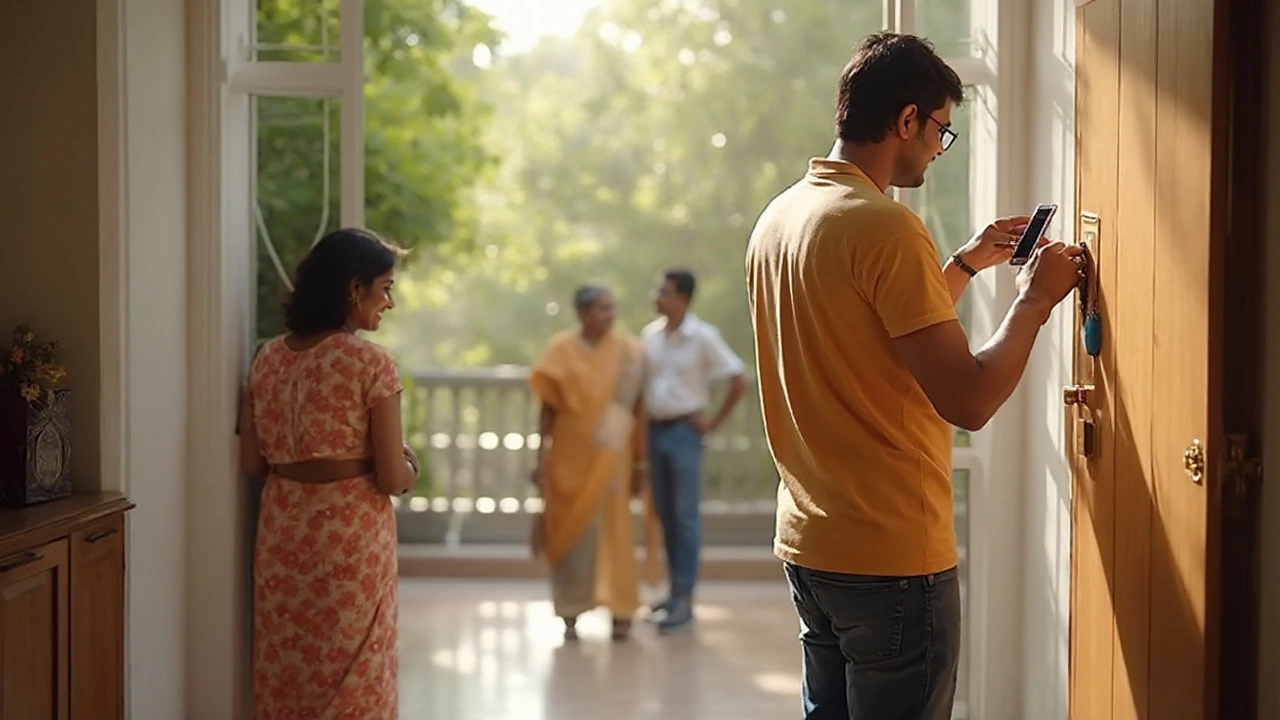
You don’t call a locksmith because you’re bored. You call because you’re stuck-usually on the wrong side of your own front door. The most common job locksmiths handle isn’t glamorous hardware upgrades or new-build installations. It’s lockouts: gaining entry when someone’s locked out of a home, flat, or office. If you want a straight answer, plus what happens next, what it costs in the UK, and how to avoid making the same call twice, you’re in the right place. I live in Bristol, and I’ve seen the same pattern play out on terraced streets, new-build estates, and everything in between.
TL;DR and the Real Answer You Came For
- The most common locksmith task: lockouts (also called “gain entry” or “emergency entry”).
- Typical UK time on site: 10-45 minutes for a standard door; more if the lock is high-security or damaged.
- Typical UK cost (2025): £65-£120 off-peak, £90-£180 evenings/weekends; parts are extra if a lock needs replacing.
- Most entries are non-destructive: a pro will pick, bypass, or manipulate the lock first. Drilling is last resort.
- Next most common tasks: key cutting, rekeying (changing pins), cylinder/lock replacement, and uPVC multipoint fixes.
What drives the volume? Everyday life. Keys left inside. A nightlatch that snibbed itself. A uPVC door that pulled shut with the keys still on the sofa. A dead battery in a smart lock. And yes, the classic “I took the bins out and the door blew shut.”
Lockouts dominate emergency calls because they’re urgent, they can’t wait for “tomorrow,” and they’re universal-every type of property and door can cause them. UK-wise, the Master Locksmiths Association (MLA) trains for non-destructive entry as a core skill set because it’s the work locksmiths see most often.

How Pros Handle Lockouts, What It Costs, and What You Can Do Now
Let’s break down what a good locksmith actually does on a lockout, and how you can make the call-out faster, cheaper, and less stressful.
locksmith lockout
Step-by-step: What happens in a typical lockout
- Quick assessment at the door: The locksmith identifies the door type and lock family. In the UK that’s usually one of these: timber door with a nightlatch (Yale-style) and/or a mortice deadlock (often BS 3621), or a uPVC/Composite door with a euro cylinder and a multipoint mechanism.
- Non-destructive first: They try picking or bypassing. Tools change by lock: for nightlatches, they may slip or shim if lawful and appropriate; for euro cylinders, they’ll pick via the keyway; for mortices, they might use dedicated mortice picks. The aim is a clean, no-damage open.
- Escalation if needed: If the lock is faulty, the key is snapped, or the cylinder is anti-pick/anti-bump at a higher rating (TS 007, 3-star), non-destructive may fail. Then the locksmith might drill with surgical precision, replace the cylinder, and hand you new keys.
- Verify you’re allowed in: Expect ID checks and proof of right to access. Reputable locksmiths won’t open a door for anyone who “just says so.”
- Options on the spot: If keys are lost or stolen, the locksmith will suggest rekeying or replacing the cylinder to keep the property secure. If the mechanism is worn (common on older uPVC multipoints), they’ll advise a fix or upgrade.
UK pricing and timing (2025)
Rates vary by region and time of day. In Bristol and across much of the UK:
- Off-peak call-out: £65-£120 for a standard lockout where the door opens without parts.
- Evenings/weekends: £90-£180 depending on distance and demand.
- Replacement cylinders (standard): £20-£50 for basic euro cylinders; £60-£120 for high-security options (TS 007 3-star).
- Mortice lock replacement: £45-£110 for the lock case; labour varies by door and chiselling needed.
- uPVC multipoint gearbox: £65-£140 for the part; full strip replacement can be more.
Good firms quote a clear call-out fee, then add parts if needed. Ask for a price range before booking and confirm whether VAT is included.
What you can try before you call
- Check for another entry: Side door, back door, a flatmate’s key, a neighbour who holds a spare.
- Nightlatch snibbed? Sometimes lifting the door gently or pressing it inward while turning can relieve pressure. Don’t force it.
- Smart lock dead battery? Many have a 9V emergency power contact-check your model’s manual.
- Don’t wedge a bank card in: You’ll likely damage the card and achieve nothing on modern, tight-fitting doors.
If you rent, call your landlord or managing agent first; they may have a preferred locksmith or hold a spare.
Rekey vs replace: quick rule of thumb
- Rekey (changing pins/tumblers) when: you still like the hardware but want the old keys useless-e.g., after a roommate moves out or you misplaced a key and don’t want to risk it.
- Replace when: the lock is worn, low security, or incompatible with insurance needs (e.g., non-BS 3621 on external timber doors; non-TS 007 on vulnerable euro cylinders). Replacement is also typical if drilling was required.
UK insurers often expect BS 3621 or equivalent for locks on external timber doors, and TS 007 3-star (or 1-star cylinder plus 2-star handles) for euro setups. Check your policy wording. Upgrading after a lockout can be a smart “two birds, one stone.”
Top reasons people get locked out (UK patterns)
- Nightlatch self-lock: Door swings shut behind you. Classic on Victorian terraces.
- Keys left inside and turned: A key left on the inside of a euro cylinder can block the outside key from turning on many models.
- uPVC multipoint failure: The handle lifts but the latch won’t retract, or the gearbox has failed.
- Key snapped in the lock: A brittle key or worn cylinder bites back.
- Smart lock battery died: No backup power used, or no physical key cylinder fitted.
What tools open doors, and why it matters
A competent locksmith carries picks, decoders, specialty mortice and nightlatch tools, letterbox tools (legal/ethical use only), plug spinners, and precision drills. The point isn’t the gadget show-it’s to minimise damage. Non-destructive entry is faster to tidy up and usually cheaper. If your locksmith reaches straight for the drill on a basic nightlatch at 2pm on a Tuesday, ask why.
| Common Task (UK) | Typical Frequency | Avg. Time on Site | Indicative Cost (2025) | Notes |
|---|---|---|---|---|
| Lockout (gain entry) | High | 10-45 min | £65-£120 off-peak; £90-£180 out-of-hours | Usually non-destructive on standard locks |
| Key extraction (snapped key) | Medium | 10-30 min | Often included in call-out; add £20-£50 if cylinder needs replacing | Common with worn cylinders or old keys |
| Rekey / cylinder pinning | Medium | 20-45 min | £40-£80 labour + pins; often cheaper than full replacement | Good after lost/stolen keys |
| Cylinder replacement (euro) | Medium | 20-45 min | £60-£180 parts+labour depending on security rating | Consider TS 007 3-star |
| uPVC multipoint repair | Medium | 30-90 min | £85-£220 parts+labour | Gearboxes fail with age/misalignment |
| Mortice lock upgrade (BS 3621) | Low-Medium | 45-120 min | £120-£250 parts+labour | May be required by insurance |
How to avoid the next lockout
- Keep a coded key safe or leave a spare with a neighbour you trust.
- Choose a euro cylinder with emergency function (turns from outside even if a key is inside), if suitable for your door.
- If you use a nightlatch, consider a model with an internal handle you can’t accidentally deadlock from outside.
- For smart locks, set a battery reminder schedule and keep a 9V battery in the hallway just in case.
- Fix door alignment: if you need to yank the handle to latch, you’re wearing the mechanism. A 5-minute hinge adjustment now can save you a midnight lockout later.

Examples, Checklists, and FAQs You’ll Actually Use
Three quick scenarios (and what a pro does)
1) Keys left inside a Bristol flat with a euro cylinder door. The cylinder is standard, no key on the inside. A locksmith will attempt picking non-destructively. If a key is turned on the inside and the cylinder lacks double clutch/emergency function, they may decode or use a specialist technique; if all else fails, they’ll drill and replace the cylinder. You get new keys on the spot.
2) Victorian terrace with a nightlatch that slammed shut. A trained tech can often bypass the latch without damage using lawful methods. If the nightlatch has a deadlocking feature engaged, they might pick the rim cylinder or drill it if it’s a hardened, high-security variant.
3) Stiff uPVC door that won’t open even with the key. Likely a failing multipoint gearbox. The locksmith gets the door open without bending the sash, diagnoses the mechanism, and swaps the gearbox or full strip. They’ll adjust keeps/hinges so the new part isn’t stressed.
Call-out checklist (print or save)
- State the problem clearly: “Locked out; keys inside; uPVC door; handle lifts to lock.”
- Ask for: estimated arrival time, price range, and whether VAT is included.
- Confirm: non-destructive entry attempted first, and parts pricing before fitment.
- Prepare ID and proof of address or tenancy.
- If keys are lost or stolen: ask about rekeying or cylinder replacement at the same visit.
- After opening: request hinge/keep alignment check to prevent repeat issues.
Buyer-beware: avoid common pitfalls
- Too-good-to-be-true ads: Rock-bottom call-out prices often hide inflated “parts.” Ask for a total range.
- Drill-first approach: On common locks, a pro should attempt picking or bypass first.
- No ID checks: It’s a red flag if a locksmith doesn’t care who you are. Reputable pros do.
- Unknown brands: If you’re upgrading, ask for BS 3621 (timber) or TS 007 ratings (euro cylinders/handles). These are recognised by insurers in the UK.
Decision helper: Do I rekey, replace, or upgrade?
- Rekey if: you like the hardware and just need new keys/security after a loss.
- Replace if: the lock is worn, damaged, or low security; drilling was needed; keys are stolen with ID attached.
- Upgrade if: your insurer requires BS 3621 (timber) or TS 007 3-star (euro) and you don’t currently meet it, or you’ve had lock-snapping in the area.
Mini-FAQ
What’s the fastest lock to open? Basic nightlatches and standard euro cylinders on well-fitted doors often open quickly with the right skill. High-security cylinders, misaligned doors, and damaged mechanisms take longer.
Will a locksmith damage my door? The goal is no. Most locksmiths succeed non-destructively on standard locks. Drilling is controlled and targets the cylinder, not the door leaf or frame.
Can a locksmith open a smart lock? Yes-either via the backup key cylinder or an emergency power method. If the smart lock has no keyway and is dead, you may need manufacturer-specific procedures.
Should I call the police for a lockout? If it’s your property and there’s no crime in progress, this is a locksmith job. Police won’t attend for routine lockouts.
Do I need BS 3621? If your external timber door is covered by home insurance, many policies expect a BS 3621 mortice deadlock (or equivalent). Check your policy wording.
How many keys come with a new cylinder? Typically 2-5. Ask for extra cuts on site or at a reputable key cutter. Keep a record of any key security cards for restricted systems.
What if I’m a tenant? Check your tenancy. You can usually call a locksmith for a lockout you caused, but you may pay the bill. If the lock fails through fair wear and tear, it’s often the landlord’s responsibility.
For businesses and landlords
- Master-key systems minimize key count while controlling access. Plan rekey schedules to align with staff changes.
- Keep a lock schedule: door types, cylinder lengths, handings. It speeds up replacements and reduces ordering mistakes.
- After-hours coverage: set expectations and a cap for emergency rates with your chosen locksmith in advance.
Training angle (why pros practice this nonstop)
In UK locksmith courses, non-destructive entry for common domestic locks is drilled hard because it’s the bread-and-butter call. Trainees practice on real nightlatches, mortice setups, and euro cylinders until muscle memory kicks in. Associations like the MLA emphasise ethics (ID checks and right-to-access) alongside technique-because doing it right protects both the customer and the trade.
What I’ve seen locally
In Bristol, uPVC doors lead the call-outs in newer estates; the multipoint mechanism plus a basic cylinder is a common combo. In older terraces, nightlatches cause the classic “pop out for milk, door snibs shut” saga. Both are solvable fast by someone who knows the hardware. The difference between a smooth, clean open and a messy drill often comes down to the tech’s training and patience.
Simple habits that save you money
- Spare key protocol: one neighbour, one family member, one coded key safe. Redundancy is your friend.
- Monthly door check: does the latch throw cleanly; does the handle lift without grinding; do you need shoulder force to close? Fix alignment now.
- Label keys smartly: never put your address on a keyring. Use a phone number or anonymous ID tag service.
If your keys were stolen
- Call your bank apps to freeze cards, then report theft to the police (crime reference for insurance).
- Ask the locksmith to rekey/replace affected cylinders right away.
- Review your external door standards (BS 3621/TS 007) and upgrade if needed.
If you’re dealing with weather or late-night conditions
- Get somewhere safe and lit; confirm the locksmith’s ETA and vehicle details.
- Ask for a fixed or capped price before they set off.
- Have ID ready and keep your phone charged. If you feel uncomfortable at any point, you can step back and call a friend or neighbour to be present.
Why lockouts will keep leading the charts
Even with smart tech, life happens. Batteries die, people forget keys, doors misalign, and kids slam doors shut. As homes blend old hardware with new gadgets, locksmiths spend more time bridging both worlds-keeping non-destructive methods sharp while knowing when a clean drill and a proper upgrade is best for safety and insurance.
Quick reference: what to ask your locksmith
- “Will you attempt non-destructive entry first?”
- “What’s the call-out fee, VAT status, and expected total?”
- “If parts are needed, what are the options and costs?”
- “Can you check alignment so this doesn’t happen again?”
- “Do the locks meet BS 3621/TS 007 if my insurer asks?”
Next steps and troubleshooting by scenario
Homeowner locked out, keys inside: Call a vetted locksmith, state your door type, ask for non-destructive first, and request a quick alignment check after opening. Consider adding an emergency-function euro cylinder so an inside key won’t block you again.
Tenant locked out: Call your landlord/agent first if possible. If you must arrange it yourself, keep the invoice and photos. If the lock failed (not your mistake), you can request reimbursement.
Keys lost or suspected stolen: ReKey or replace cylinders the same day. If you have a letterbox, fit a guard and consider 3-star cylinders to resist snapping or letterbox fishing.
Smart lock failure: Use emergency power or backup key. If none, a locksmith can help open and advise on adding a failsafe. Keep spare batteries by the door.
Stiff or grinding uPVC: Book a tune-up even if you’re not locked out. Minor adjustments protect the multipoint gearbox and save you from a future midnight call.
So, what’s the most common locksmith task? It’s the one you feel in your gut the second the door clicks shut and you’re outside-lockouts. The good news is a trained pro can usually get you back in fast, with your door and dignity intact. Learn the basics, ask the right questions, and you’ll handle it like a pro next time-not a panic.
